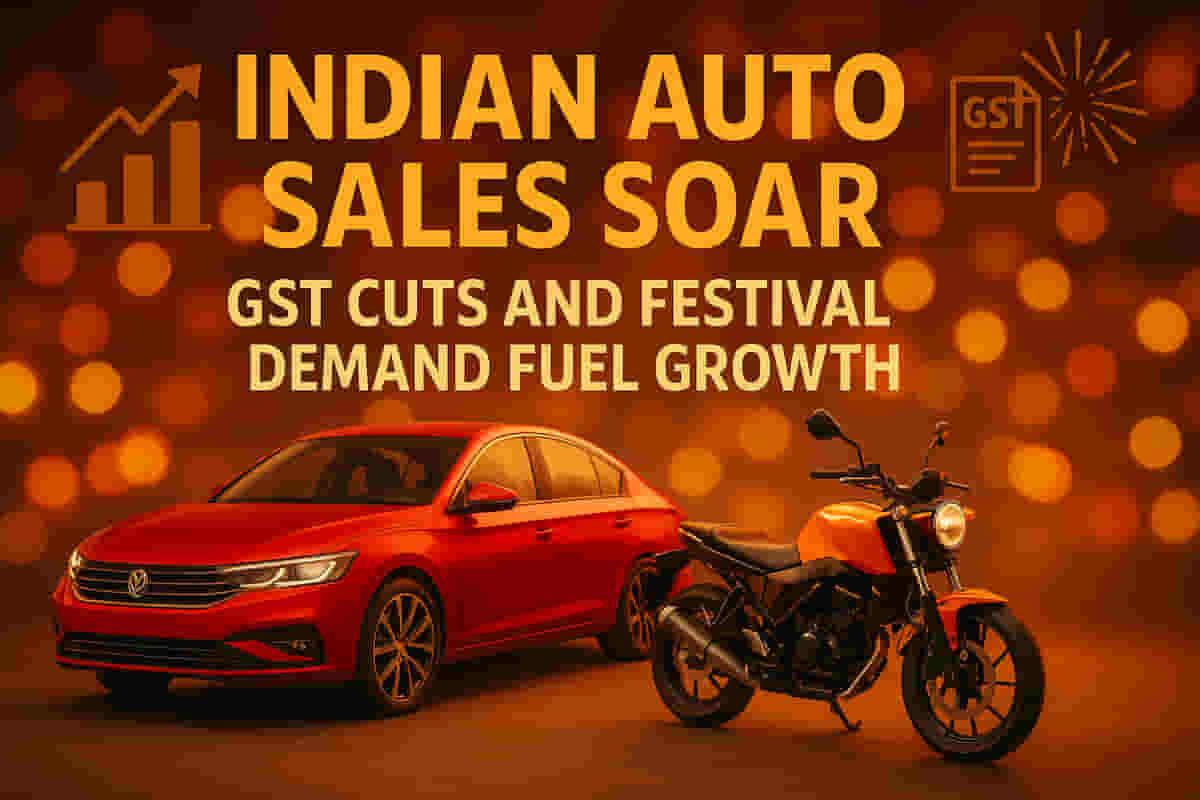GST Cuts and Festival Cheer Fuel Strong Sales Outlook for Indian Auto Sector
Auto
|
Updated on 30 Oct 2025, 03:50 pm
Reviewed By
Aditi Singh | Whalesbook News Team
Short Description :

▶
Stocks Mentioned :
Detailed Coverage :
The Indian automobile industry is experiencing a strong recovery, driven by recent Goods and Services Tax (GST) reductions and the ongoing festival season. Automobile experts anticipate a significant surge in sales across all vehicle categories, from entry-level passenger cars to two-wheelers.
Nomura reports that passenger vehicle (PV) demand growth is projected to be in the teens, with an estimated 3 per cent year-on-year wholesale growth and a strong 14 per cent year-on-year retail volume growth observed in October. This pickup is linked to festival demand and GST cuts, potentially benefiting Original Equipment Manufacturers (OEMs) with higher dealer inventory.
In the two-wheeler segment, ICRA noted a 6.5 per cent year-on-year retail sales growth. After initial purchase deferrals, demand escalated following GST implementation, bolstered by festival tailwinds and pent-up demand. Wholesale volumes also rose by 6.0 per cent. With healthy exports and increasing electric two-wheeler penetration, ICRA forecasts a 6-9 per cent wholesale volume growth for FY26, supported by improved affordability and anticipated rural demand.
Key growth drivers identified include sustained festival demand, steady rural incomes, and the impact of GST reductions. The Federation of Automobile Dealers Associations (FADA) anticipates festival sales in 2025 could be the highest ever recorded, as reduced down payments and EMIs encourage consumer purchases.
Impact: This news is highly impactful for the Indian stock market, particularly the automotive sector. Increased sales volumes and improved affordability translate to better revenue and potential profit growth for auto manufacturers, component suppliers, and dealerships. This could lead to positive stock price movements for companies within the sector. The positive sentiment may also spill over to ancillary industries.
Impact Rating: 8/10
Difficult Terms: GST: Goods and Services Tax, a comprehensive indirect tax levied on the supply of goods and services in India. Passenger Vehicle (PV): Vehicles like cars, SUVs, and vans used for personal transportation. Wholesale: The sale of goods in large quantities from a manufacturer or distributor to a retailer or another business. Retail: The sale of goods directly to end consumers. YoY: Year-on-Year, a comparison of a metric to the same period in the previous year. OEMs: Original Equipment Manufacturers, companies that produce finished goods or components for other companies to sell under their brand name. Dealer Inventory: The stock of vehicles held by car dealerships for sale. FY26: Fiscal Year 2026, which typically runs from April 1, 2025, to March 31, 2026, in India. EMIs: Equated Monthly Installments, a fixed amount paid by a borrower to a lender at a specified date each month. FADA: Federation of Automobile Dealers Associations, an apex body representing automobile dealers in India.
More from Auto

Auto
Suzuki and Honda aren’t sure India is ready for small EVs. Here’s why.
Latest News

Brokerage Reports
Stocks to buy: Raja Venkatraman's top picks for 4 November

Mutual Funds
Quantum Mutual Fund stages a comeback with a new CEO and revamped strategies; eyes sustainable growth

Tech
Why Pine Labs’ head believes Ebitda is a better measure of the company’s value

Banking/Finance
SEBI is forcing a nifty bank shake-up: Are PNB and BoB the new ‘must-owns’?

Industrial Goods/Services
India’s Warren Buffett just made 2 rare moves: What he’s buying (and selling)

Startups/VC
a16z pauses its famed TxO Fund for underserved founders, lays off staff
Energy Sector

Energy
India's green power pipeline had become clogged. A mega clean-up is on cards.
Renewables Sector

Renewables
Brookfield lines up $12 bn for green energy in Andhra as it eyes $100 bn India expansion by 2030
Energy Sector

India's green power pipeline had become clogged. A mega clean-up is on cards.
Renewables Sector
